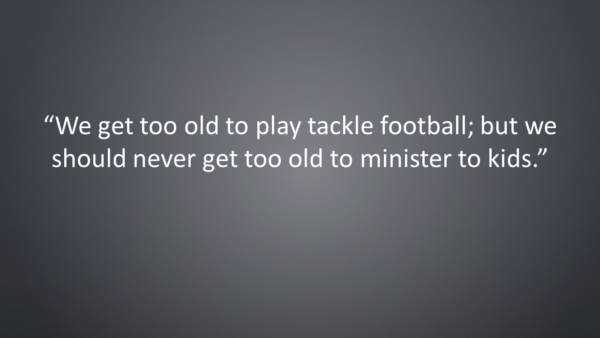When Parents Are Not Partners in Your Church’s Youth Ministry…

The ideal scenario for any youth pastor, of course, would be to have committed Christian parents as active, supportive, and true partners in the church’s youth ministry. Christian parents are the ones most accountable for the spiritual growth and development of their kids. The Scriptures are clear that parents, especially fathers, are to bring their kids up “in the training and admonition of the Lord,” (Ephesians 6:4, ESV). It would be great if those same parents saw the need for their kids to be faithfully and actively involved in the established mission of church youth ministry.
There are definitely some parents who love what the church is doing with teenagers – and who appreciate the tangible benefits their own teenagers experience as enthusiastic participants in those functions. To be sure, there are Christian parents out there who realize that the church is also responsible for the spiritual maturity of their kids. They have studied Ephesians 4 and see the importance of the local church teaching their kids to “no longer be children,” but to “grow up in all things into Christ,” (vv14-15, NKJV).
Both God-ordained institutions, the Christian home and the local church, have the same God-given purpose to teach the life-changing Gospel of Jesus Christ and to train the next generation to grow into lasting spiritual maturity.
There certainly are some parents who are vigorous contributors to the process of true spiritual growth in the lives of their kids, and who are also absolutely committed to what the church youth ministry is trying to do. In fact, the statistics overwhelmingly show that the students who grow up in those homes are undoubtedly the ones who grow up to live consistent Christian lives as adults themselves. That situation is what God wants – and it is what works in life.
But let’s get real. The above-described scenario is getting harder and harder to find.
Today’s Changing Households
Current demographic trends reveal an ever-increasing number of non-traditional, hurting, and dysfunctional households. Youth workers and other church leaders should do their homework. Look at the census information and other cultural demographics in your community. There is no doubt that the number of kids today from those non-traditional households is growing exponentially.
In fact, a recent book from the Barna Group, Households of Faith: The Rituals and Relationships That Turn a Home Into a Sacred Space, has challenged churches to quit using the term “family ministry,” because so many households do not readily identify as true “families.”
The authors of perhaps the definitive book on today’s teenagers, Generation Z: A Century in the Making, report some alarming changes in the makeup of the average American household. This includes that a significant portion of kids today do not live with both of their natural parents, along with an increasing number of single-parent homes, an expanding number of children living in cohabiting households, and a growing number of same-sex households with children.
A Post-Christian Mindset
Another reality that today’s youth workers must face is the dominating presence of a post-Christian and post-church mindset in contemporary culture. Even in America, there is a rapidly advancing mentality that questions and even denies the importance of religion, maybe even especially that of genuine Christianity – living consistently for the Lord and making Him first place in life.
Too many of today’s parents, guardians, and adult caregivers, it seems, would rather have their kids get a high-paying job, win a scholarship to college, or progress toward a highly respected career than they would commit to having their children faithfully involved in the church’s youth ministries. Of course, this attitude is not universal, but the trends indicate that it is becoming fairly ubiquitous in today’s world.
A Lack of Loyalty to the Local Church
Akin to the post-Christian philosophy is the relatively recent departure of Millennials and Gen Zers from the Church. One author has stated, “Every indication is that the nones will be the largest religious group in the United States in the next decade.” (The Nones: Where They Came From, Who They Are, and Where They Are Going).
Church attendance and participation is not the scheduling priority it once was in American households. Work, school activities, and involvement in various sports often take precedence in the lives of today’s households. It seems as if most youth workers struggle with significant numbers of “church kids” who do not show up regularly for church and youth group functions due to their over-scheduled personal calendars and commitments.
What do we do about it?
This is not the time for youth workers to throw up their hands in despair or uncertainty. It must be the time for church leaders everywhere to call God’s people back to a true, radical commitment to Jesus Christ and His work in the world today. Of course, it would be amazing if all Christian parents saw the need and the importance of encouraging their kids to a committed faithfulness to church and youth ministry functions. Praise the Lord for those parents who do see it that way.
But, considering the current trends, what should youth workers do?
More than ever, it is imperative for the church to truly be the Church – and to concentrate exactly on what Christ designed His Church to do. Today’s local church youth ministries must clearly communicate the life-changing Gospel of Jesus Christ. Youth ministries and kids’ ministries alike should prayerfully consider a quick return to this movement’s historical roots of developing relevant, creative, and energetic initiatives to share the Gospel with kids and students. This will require training students to share their faith and providing opportunities for evangelism to thrive.
It is also time for churches to recommit to Christ’s command to make disciples. Youth workers need to consider altering their programming approach to allow for more life-on-life discipleship as described in 2 Timothy 2:2. Christ’s ministry with His disciples did not look like an hourly program on Wednesday evenings and a few other scattered events. His ministry was real life in real-time and was a commitment of both the disciples and the Teacher.
The Bible is also clear that God’s purpose for pastor-teachers is to “equip saints for the work of ministry” (Ephesians 4:11-16, ESV). This demands intergenerational connections with the church as a whole. Church leaders and members should understand and appreciate the imperative that believers of all ages be trained, motivated, and allowed to use their gifts and abilities in significant service for Christ.
Culture is changing right before our eyes. It might be easy to respond with criticism and discouragement. But God is still on the throne and is still using His Church to make an impact for eternity. He can and will continue to use youth workers to share the Gospel, to make disciples, and to equip God’s people to serve Him with their lives.
This article originally appeared: When Parents Are Not Partners in Youth Ministry (NNYM – National Network of Youth Ministries) (youthworkers.net).









